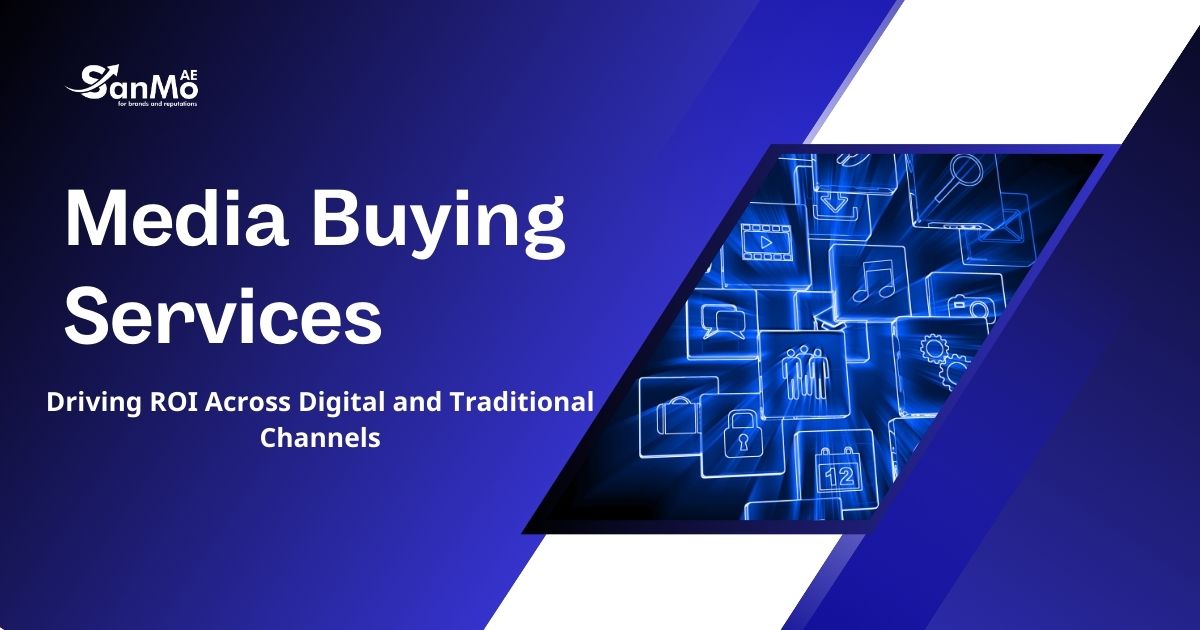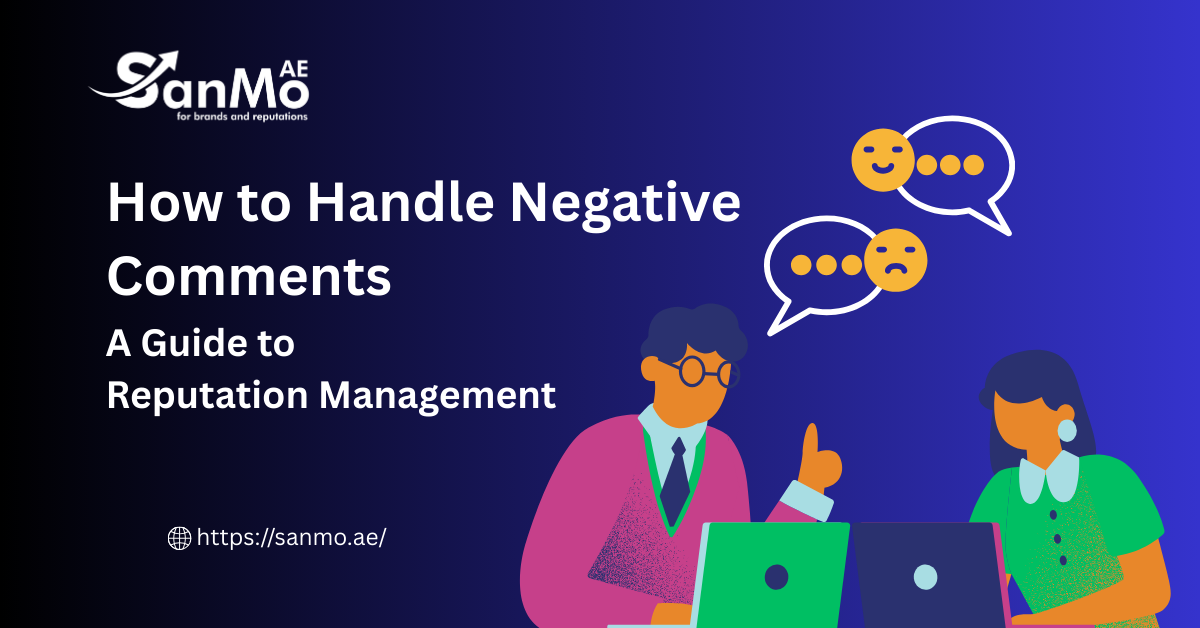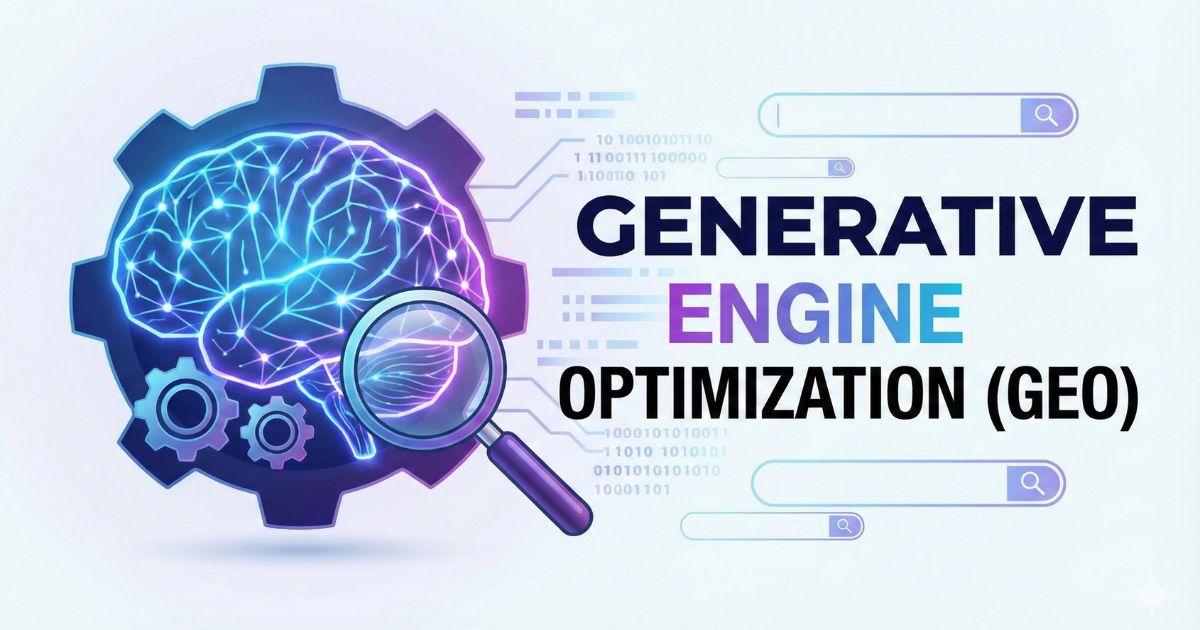Running successful advertising campaigns requires more than creative content and compelling messaging. The strategic placement of those ads—determining where, when, and how they appear—can make or break your marketing efforts. Media buying services handle this complex process, connecting businesses with their target audiences through carefully negotiated ad placements across multiple channels.
Media buying involves purchasing advertising space and time across various platforms, from traditional outlets like television and radio to digital channels including social media, search engines, and display networks. Professional media buying services bring expertise, industry relationships, and data-driven strategies that help businesses maximize their advertising investment while reaching the right people at the optimal moments.
This comprehensive guide explores everything you need to know about media buying services, from understanding the core functions to selecting the right partner for your business goals. Whether you’re a startup looking to establish market presence or an established company seeking to optimize your advertising strategy, understanding media buying services will help you make informed decisions about your marketing investments.
What Are Media Buying Services?
Media buying services encompass the strategic planning, negotiation, and execution of advertising placements across various media channels. These services go beyond simply purchasing ad space—they involve comprehensive market research, audience analysis, competitive intelligence, and ongoing campaign optimization to ensure maximum return on advertising spend.
Professional media buyers act as intermediaries between businesses and media outlets, leveraging their industry relationships to secure favorable rates and premium placements. They possess deep knowledge of media landscapes, understanding which platforms deliver the best results for specific industries, target demographics, and campaign objectives.
The scope of media buying services typically includes budget allocation across channels, timing optimization, audience targeting, performance monitoring, and continuous campaign refinement. Media buyers use sophisticated tools and platforms to track campaign performance in real-time, making data-driven adjustments to improve outcomes and maximize efficiency.
Key Components of Media Buying Services
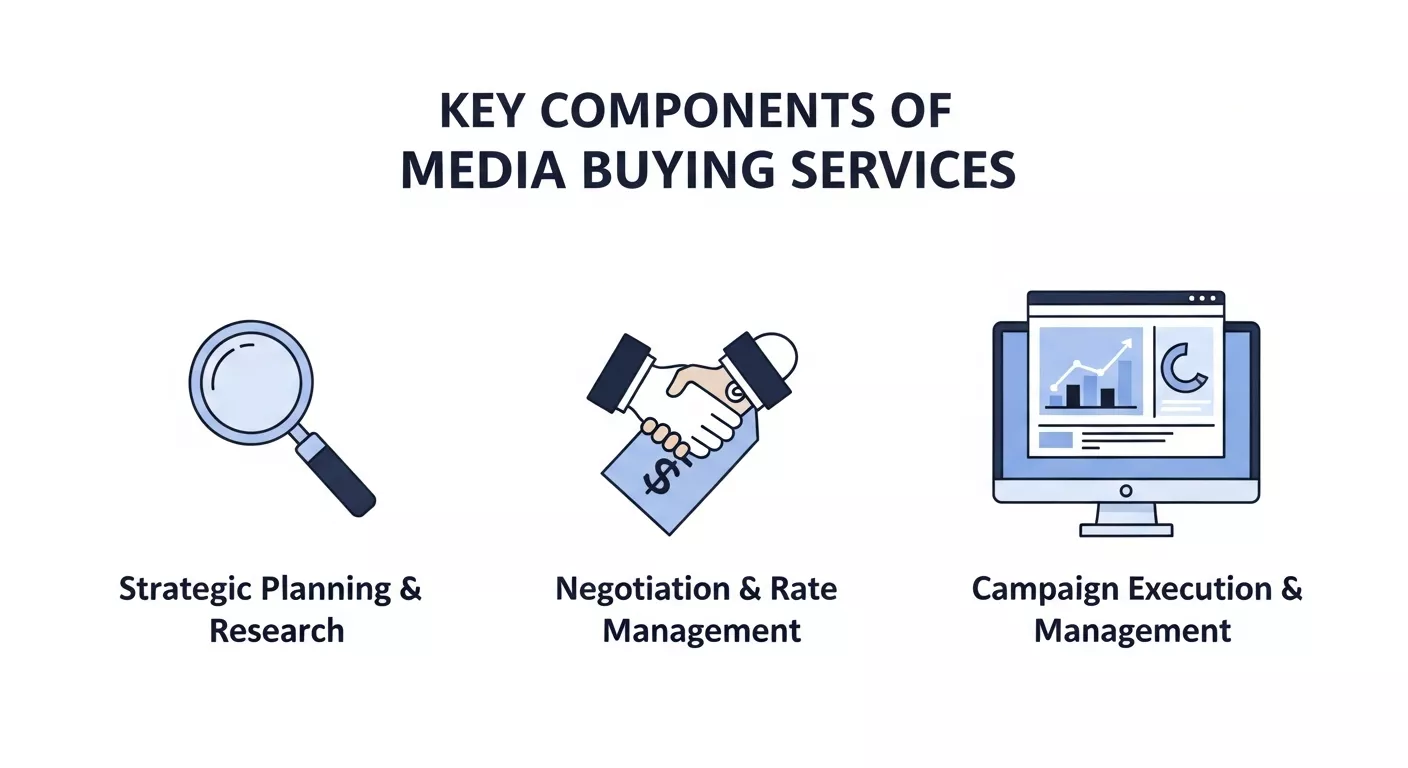
Strategic Planning and Research
Effective media buying begins with comprehensive research and strategic planning. Media buying services conduct thorough market analysis, studying target audience behaviors, media consumption patterns, and competitive landscapes. This research informs placement decisions, helping determine which channels will most effectively reach desired demographics.
Audience research involves analyzing demographic data, psychographic profiles, and media consumption habits. Media buyers identify where target audiences spend their time, what content they engage with, and when they’re most receptive to advertising messages. This intelligence guides both channel selection and timing strategies.
Negotiation and Rate Management
One of the primary values media buying services provide is their ability to negotiate favorable rates and terms with media outlets. Established media buyers maintain relationships with publishers, broadcasters, and platform representatives, often securing better pricing and placement options than businesses could achieve independently.
Rate negotiation extends beyond basic cost considerations. Media buyers negotiate for value-added services, preferred placement positions, frequency discounts, and performance guarantees. They understand market rates across different channels and can identify opportunities for cost-effective placements that deliver strong results.
Campaign Execution and Management
Media buying services handle the technical aspects of campaign execution, ensuring ads run according to specified parameters. This includes creative asset delivery, tracking implementation, and coordination with various media partners to ensure smooth campaign launches.
Campaign management involves ongoing monitoring and optimization throughout the advertising period. Media buyers track performance metrics, adjust targeting parameters, reallocate budgets between high-performing and underperforming channels, and troubleshoot any technical issues that arise.
Types of Media Buying Services
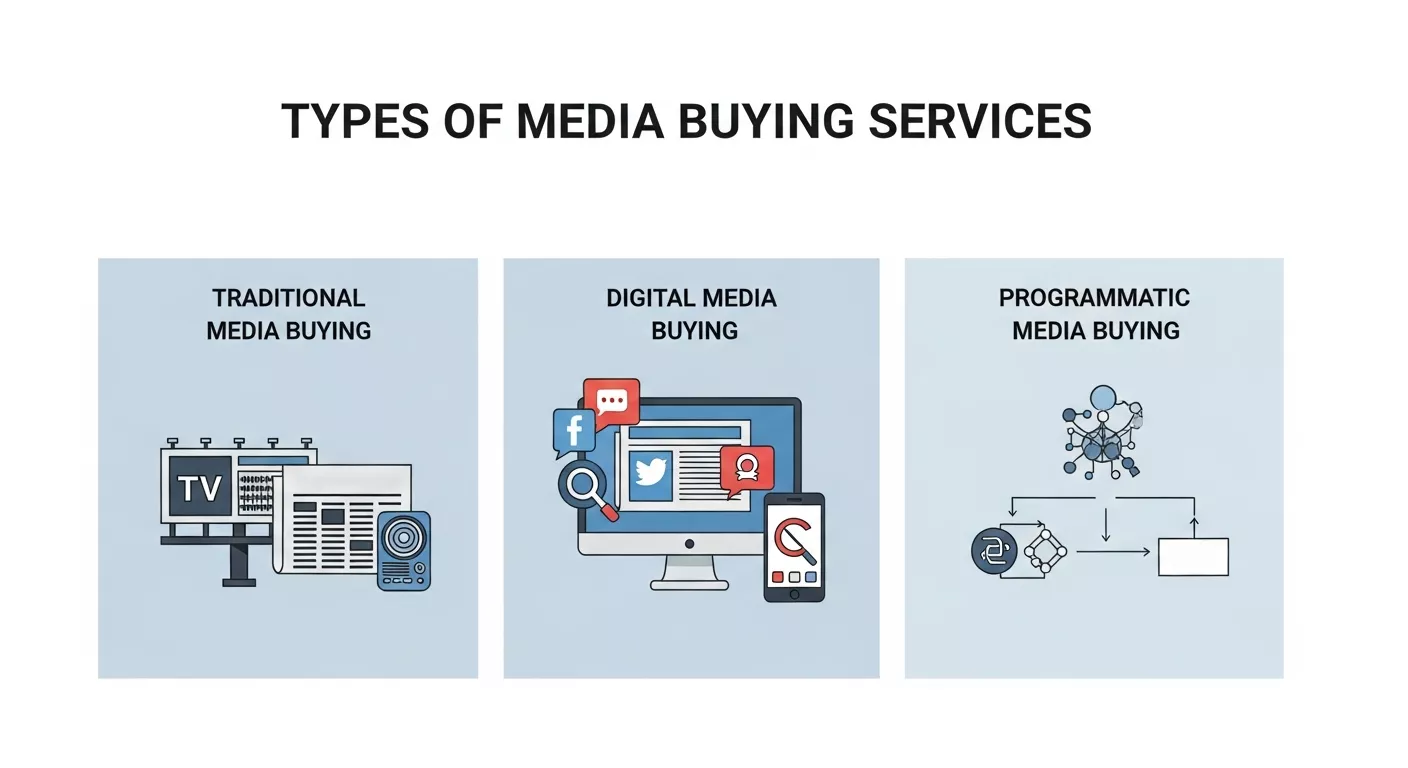
Traditional Media Buying
Traditional media buying focuses on conventional advertising channels, including television, radio, print publications, and outdoor advertising. These channels often require significant upfront investments and longer-term commitments, making professional expertise particularly valuable for negotiation and placement optimization.
Television media buying involves understanding programming schedules, audience demographics by time slot, and seasonal viewing patterns. Radio buying requires knowledge of listening habits, market penetration, and local versus national opportunities. Print media buying considers circulation numbers, reader demographics, and publication timing.
Digital Media Buying
Digital media buying encompasses online advertising across search engines, social media platforms, display networks, video platforms, and mobile applications. Digital channels offer more granular targeting options and real-time performance data, but require expertise in platform-specific tools and optimization techniques.
Search engine marketing involves keyword research, bid management, and landing page optimization. Social media buying requires understanding platform algorithms, audience targeting options, and creative format requirements. Display advertising involves network selection, audience segmentation, and retargeting strategies.
Programmatic Media Buying
Programmatic media buying uses automated systems and algorithms to purchase digital advertising space in real-time. This approach, also called programmatic advertising, enables more precise targeting and efficient budget utilization, but requires technical expertise and sophisticated platform management.
Programmatic buying involves demand-side platforms (DSPs), supply-side platforms (SSPs), and data management platforms (DMPs) that work together to automate the ad buying process. Media buying services manage these complex systems, ensuring campaigns reach intended audiences while maintaining cost efficiency.
Benefits of Professional Media Buying Services
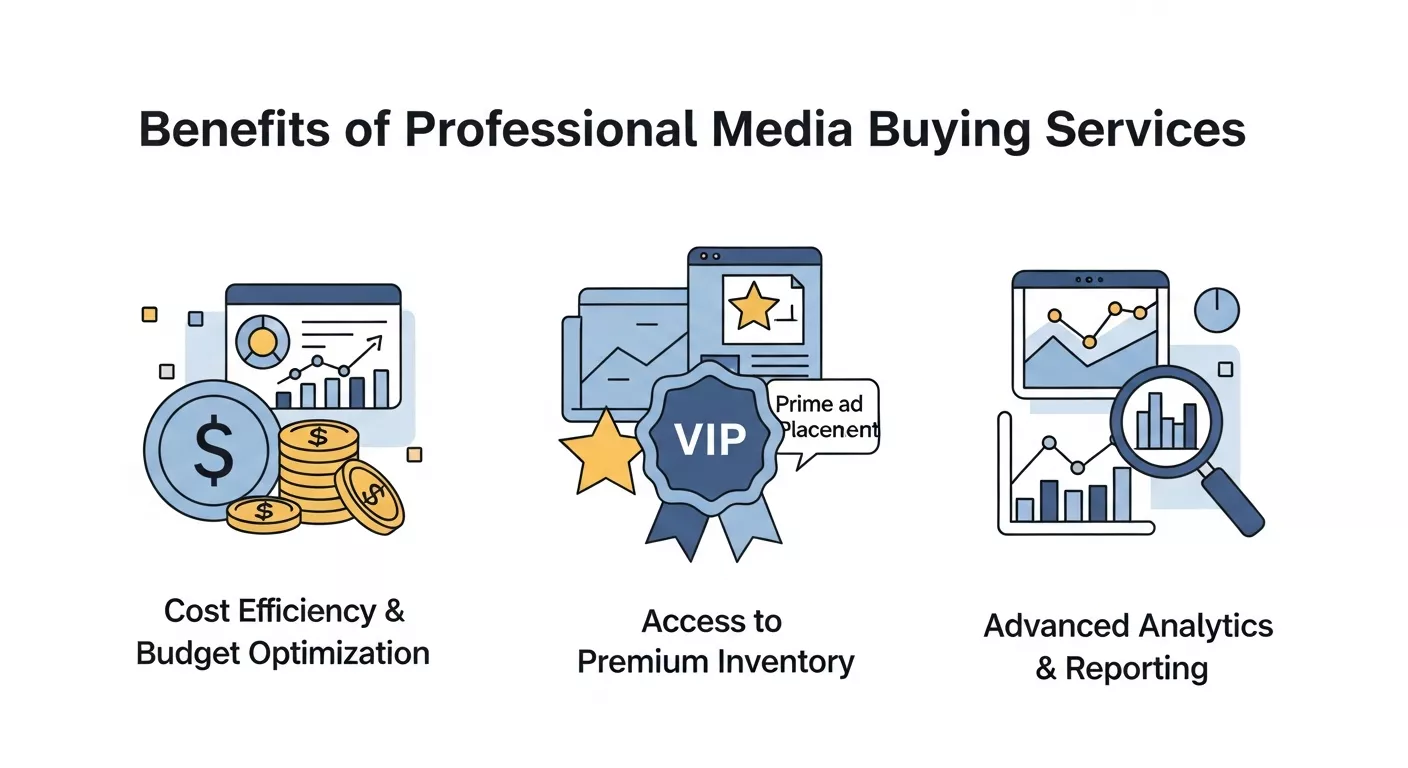
Cost Efficiency and Budget Optimization
Professional media buying services typically achieve better cost efficiency than in-house efforts due to their negotiating power, industry relationships, and experience optimizing campaigns across multiple channels. They understand market rates, identify cost-saving opportunities, and allocate budgets strategically to maximize impact.
Media buyers can often secure volume discounts, package deals, and value-added services that reduce overall campaign costs while improving performance. Their expertise in campaign optimization helps eliminate wasteful spending and focuses resources on high-performing placements and audiences.
Access to Premium Inventory
Established media buying services have access to premium advertising inventory that may not be available through standard channels. This includes exclusive placements, first-right-of-refusal opportunities, and access to high-demand time slots or positions.
Premium inventory access can significantly impact campaign performance, providing opportunities to reach audiences during peak engagement periods or secure prominent placement positions that enhance brand visibility and message impact.
Advanced Analytics and Reporting
Media buying services provide comprehensive analytics and reporting that go beyond basic performance metrics. They offer insights into audience behavior, campaign attribution, competitive analysis, and recommendations for future optimization.
Advanced reporting helps businesses understand which channels, audiences, and creative approaches deliver the best results. This intelligence informs broader marketing strategies and helps optimize future campaigns for improved performance and efficiency.
Choosing the Right Media Buying Service
Evaluating Experience and Expertise
When selecting a media buying service, evaluate their experience in your industry and with your target channels. Look for agencies with proven track records, relevant case studies, and expertise in the specific media types most important to your business goals. SanMo AE’s Media Buying Services combine years of industry experience with deep knowledge of both traditional and digital channels, helping businesses maximize their advertising ROI.
Consider their team’s qualifications, industry certifications, and ongoing education efforts. Media buying is constantly evolving, particularly in digital channels, so choose partners who stay current with platform changes, new targeting options, and emerging advertising technologies.
Understanding Fee Structures
Media buying services typically charge through commission-based models, fixed fees, or hybrid arrangements. Commission-based models involve percentage markups on media spend, while fixed fee arrangements provide predictable costs regardless of spend levels.
Understand what services are included in quoted fees and what might incur additional charges. Some agencies include creative development, analytics reporting, and strategy consulting in their base fees, while others charge separately for these services.
Assessing Technology and Tools
Modern media buying requires sophisticated technology platforms for campaign management, performance tracking, and optimization. Evaluate potential partners’ technology capabilities, including their access to premium tools, data sources, and automation platforms.
Consider whether their technology integrates with your existing marketing systems and provides the level of reporting and control you need. Some businesses prefer agencies that offer client access to performance dashboards and campaign management tools.
Measuring Media Buying Success
Key Performance Indicators
Success measurement in media buying depends on campaign objectives, but common metrics include reach, frequency, cost per acquisition, return on ad spend, and brand lift. Establish clear KPIs before campaign launch and ensure your media buying service can track and report on these metrics effectively.
Consider both immediate performance indicators and longer-term brand impact metrics. While direct response metrics like clicks and conversions provide immediate feedback, brand awareness, consideration, and loyalty metrics may be more important for certain campaign types.
Attribution and Multi-Touch Analysis
Modern media buying often involves multiple touchpoints across various channels, making attribution analysis crucial for understanding true campaign impact. Work with media buying services that can provide multi-touch attribution analysis and cross-channel performance insights.
Attribution analysis helps identify which channels and touchpoints contribute most effectively to desired outcomes, enabling more strategic budget allocation and campaign optimization in future efforts.
Tips for Maximizing ROI with Media Buying
Investing in media buying services can deliver exceptional results, but businesses can further optimize performance by following best practices. Maximizing ROI involves strategic planning, careful monitoring, and ongoing adjustments to ensure every dollar spent contributes to campaign success.
Here are key strategies to get the most out of your media buying efforts:
- Define Clear Objectives: Establish measurable goals for each campaign, such as brand awareness, lead generation, or sales conversion.
- Know Your Audience: Use audience segmentation and behavioral insights to target the right people at the right time.
- Leverage Data Analytics: Monitor real-time performance metrics and adjust campaigns to improve outcomes.
- Test and Optimize: Run A/B tests on creatives, placements, and timing to identify the most effective approaches.
- Diversify Media Channels: Combine traditional, digital, and programmatic channels to maximize reach and engagement.
- Negotiate Smartly: Work with experienced media buyers, like SanMo AE, to secure premium placements and cost-effective rates.
| Tip | Description | Example of Implementation |
|---|---|---|
| Define Clear Objectives | Set specific, measurable campaign goals | Increase website leads by 20% in 3 months |
| Know Your Audience | Analyze demographics, psychographics, and behavior patterns | Target social media ads to users aged 25–34 |
| Leverage Data Analytics | Track performance metrics like CTR, CPA, and ROAS | Use Google Analytics and ad platform dashboards |
| Test and Optimize | Experiment with different creatives, placements, and bidding strategies | A/B test two video ads to see which drives more conversions |
| Diversify Media Channels | Use a mix of traditional and digital platforms to reach a wider audience | Combine TV ads with programmatic display ads |
| Negotiate Smartly | Secure better rates, premium placements, and added value through experts | Work with SanMo AE to access exclusive inventory |
By following these strategies, businesses can ensure their media buying campaigns are not only well-executed but also continuously optimized for maximum return on investment.
Making Media Buying Work for Your Business
Media buying services offer valuable expertise, industry relationships, and optimization capabilities that can significantly improve advertising performance while reducing costs and complexity. The key to success lies in selecting the right partner, establishing clear objectives, and maintaining ongoing communication about performance and optimization opportunities.
Whether you choose to work with a full-service agency, specialized media buying firm, or hybrid model depends on your specific needs, budget, and internal capabilities. Consider starting with smaller test campaigns to evaluate potential partners before committing to larger, longer-term relationships.
The investment in professional media buying services often pays for itself through improved campaign performance, cost savings, and access to opportunities that wouldn’t be available otherwise. As advertising channels continue to evolve and become more complex, the value of expert media buying guidance will only continue to grow.
Frequently Asked Questions (FAQs)
1. What are media buying services, and why do I need them?
Media buying services involve the strategic planning, negotiation, and execution of advertising placements across multiple channels. Professional media buyers, like SanMo AE, help businesses reach the right audience at the right time while optimizing budget and maximizing ROI.
2. What types of media can I buy through these services?
Media buying covers:
- Traditional media: TV, radio, print, and outdoor ads.
- Digital media: Social media, search engines, display ads, video platforms, and mobile apps.
- Programmatic media: Automated, real-time ad buying using advanced platforms for precise targeting.
3. How does SanMo AE help improve ad campaign performance?
SanMo AE combines industry relationships, advanced analytics, and real-time optimization to ensure campaigns are cost-efficient and effective. From negotiating premium placements to monitoring performance metrics, we make sure your ads deliver measurable results.
4. How do media buyers decide where and when to place ads?
Media buyers conduct thorough research on audience demographics, behavior, and media consumption habits. They also analyze competitors and market trends to determine the optimal channels, timing, and frequency for maximum impact.
5. How much do media buying services cost?
Costs vary depending on campaign scope, media types, and service models. Agencies like SanMo AE may charge through commissions on media spend, fixed fees, or hybrid structures. We provide transparent pricing and ensure that your investment is optimized for results.
6. Can media buying services help small businesses and startups?
Absolutely. Media buying services are not just for large corporations. Startups and small businesses benefit from expert guidance, cost savings, and access to premium placements that would be difficult to secure independently.
7. How is campaign success measured?
Success is tracked using key performance indicators (KPIs) such as reach, frequency, cost per acquisition, return on ad spend, and brand lift. SanMo AE also provides multi-touch attribution analysis to understand cross-channel performance.
8. How do I get started with SanMo AE?
Getting started is easy. Reach out to SanMo AE to schedule a consultation. We’ll assess your goals, recommend a tailored media buying strategy, and launch campaigns designed to deliver maximum results.
Elevate Your Advertising Strategy
with
SanMo AE
Strategic ad placement is the key to successful marketing campaigns. SanMo AE provides professional media buying services that help your business reach the right audience, at the right time, across the most effective channels.
With SanMo AE, you benefit from:
- Expert Planning and Research – Data-driven strategies and audience insights for precise ad placements.
- Optimized Budget Management – Cost-effective campaigns with premium inventory access.
- Continuous Performance Tracking – Real-time monitoring and ongoing optimization to maximize results.
- Multi-Channel Expertise – Seamless execution across traditional, digital, and programmatic channels.
Work with SanMo AE to ensure your advertising campaigns are efficient, targeted, and impactful.

